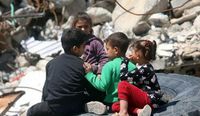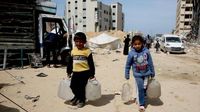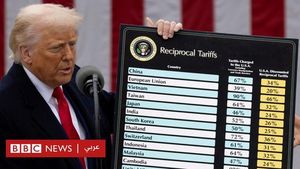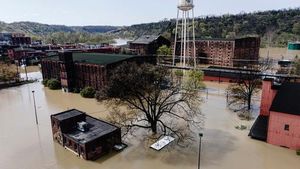As the humanitarian crisis in Gaza deepens, more than one million children have been deprived of essential aid for over a month, according to UNICEF. Since March 2, 2025, Israel has enforced a blockade on aid passage to the Palestinian territory, marking the longest duration of such restrictions since the onset of the war. The blockade has resulted in severe shortages of food, drinking water, shelter, and medical supplies, prompting urgent calls for action from international organizations.
UNICEF has sounded the alarm, emphasizing the dire consequences of the blockade for children in Gaza. Edouard Beigbeder, the regional director of UNICEF for the Middle East, stated, "The humanitarian situation is critical, and it is unacceptable that children are suffering due to the lack of access to basic necessities." The organization has a significant amount of humanitarian supplies ready to be delivered, but they remain stranded due to the Israeli blockade.
In a related development, Israel has cut off 70% of the water supply to Gaza, further exacerbating the crisis. The Israeli army has blocked the flow of water from the Israeli company Mekorot, severely impacting the availability of this vital resource in the enclave. Hosni Mehanna, a spokesperson for the municipality of Gaza, confirmed that Israeli forces have paralyzed the water supply, particularly affecting the main pipeline in the Shujaiya neighborhood, where military operations have intensified.
Mehanna remarked, "The reasons behind the interruption are unclear, but we are working with international organizations to determine if the pipeline was damaged by the ongoing bombardments." He warned that if the water flow is not restored soon, Gaza could face a total water crisis, leading to widespread dehydration and increased risk of disease outbreaks.
The situation is particularly dire for the youngest residents of Gaza. UNICEF reports that there are approximately 10,000 infants under six months who require supplementary feeding. Currently, there is only enough formula available to feed 400 children for a month, which highlights the severity of the food crisis as well.
In recent weeks, UNICEF has documented alarming statistics regarding child casualties in Gaza. As of March 31, 2025, at least 322 children have died, and 609 have been injured, averaging nearly 100 children killed or maimed daily over the last ten days of March. The organization condemned the ongoing violence and called for immediate action to protect the most vulnerable members of the population.
International humanitarian law prohibits collective punishment, yet many Palestinians believe that Israel's actions constitute a deliberate strategy to inflict suffering on the civilian population. Reports have emerged suggesting that the blockade and the associated shortages are part of a broader political agenda, reminiscent of past plans proposed by foreign leaders.
UNICEF's Beigbeder has urged the Israeli government to allow the immediate passage of humanitarian supplies, stating, "This is not a matter of charity; it is an obligation under international law." He underscored that the humanitarian crisis in Gaza is not merely a consequence of conflict but a situation that demands urgent international attention and intervention.
The situation in Gaza has drawn widespread condemnation from various human rights organizations and international bodies. The ongoing military operations, coupled with the blockade, have led to a catastrophic humanitarian situation that many experts describe as unprecedented. As the conflict continues, the lives of countless children hang in the balance, prompting urgent calls for a ceasefire and the resumption of humanitarian aid.
As the world watches, the plight of Gaza's children serves as a stark reminder of the human cost of conflict. With each passing day, the need for a resolution becomes more pressing, as the humanitarian situation deteriorates further. As UNICEF and other organizations work tirelessly to provide aid, the international community faces a moral imperative to act decisively to alleviate the suffering of those caught in the crossfire.
In conclusion, the ongoing blockade and the severe restrictions on essential supplies have created a humanitarian nightmare in Gaza. The international community must respond to the urgent calls for action to ensure that the rights and needs of the most vulnerable populations are met. Without immediate intervention, the consequences could be catastrophic and irreversible for generations to come.





